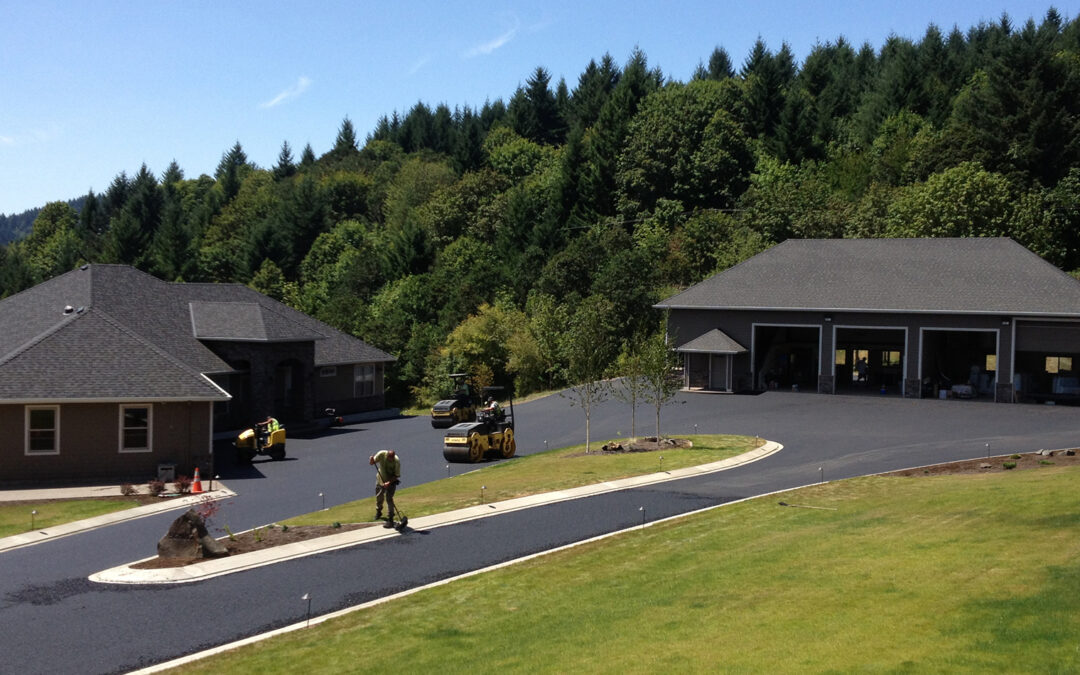A well-installed driveway is more than just a place to park your car — it’s a foundational element of your property. Grading and gravel play very important roles in ensuring your driveway’s durability and functionality. Learn how smart decisions for driveway construction can save you from headaches. Let’s look into the critical roles of expert grading and quality gravel.
Grading Done Right Is Your Foundation for Durability
What is grading? Grading is the process of shaping and leveling the ground to create a smooth and stable foundation for your driveway. It involves strategically altering the slope and contour of the land to facilitate a smooth path for a vehicle and create proper water drainage away from the driveway surface.
In terms of water, proper grading ensures that water flows away from the driveway, preventing water pooling and potential damage such as cracks, erosion or at worst, foundation issues. This critical step lays the groundwork for a durable and long-lasting driveway that can withstand the elements, and daily wear and tear. Water is the most common culprit for driveway damage here in Oregon.
Choosing the Best Gravel Options for Your Driveway
Gravel is a fundamental component of driveway construction. It provides a stable surface and aids in water drainage. What is the best gravel for a driveway? The best gravel to pick for your driveway depends on your goals as well as the driveway location and condition.
The common types of gravel used for driveways include:
- crushed stone
- pea gravel
- gravel with “fines” (dust and stone fragments)
When picking the perfect gravel for your driveway, consider these key factors:
- Size, Shape and Composition: These elements directly impact your driveway’s performance and aesthetics. For Oregon’s climate, generally 3/4-inch to 1-inch crushed stone is recommended. A mixture of crushed stone and stone dust is an ideal solid base layer due to its ability to pack well and provide stability.
- Property Specifics: When you’re choosing gravel, also consider your property’s unique design and the environmental challenges to your driveway.
- Durability and Appearance: The right gravel choice is essential for enhancing both how long your driveway lasts and how great it looks. Crushed limestone looks tidy and clean, and has strong resistance to freeze-thaw cycles. Crushed granite, on the other hand, offers extreme stability and a beautiful, natural rustic appearance.
Remember that regardless of the type of gravel used, ground compaction and grading are the keys to success.
From Dirt to Driveway: Understanding the Grading Process
Before gravel can be laid, the grading process must be meticulously done. This involves preparing the site, removing any debris and leveling the ground to the desired slope.
Can you do this yourself? Typically, no. Unless you have grading equipment on hand, it is highly recommended that you hire the pros. Hiring a professional contractor for grading work is crucial to achieving the desired slope and contour for optimal driveway performance.
Once grading is complete, it’s time to install the gravel for your driveway. The process begins with laying a base layer of gravel, typically composed of larger stones, to provide stability and support. This base layer is then compacted to create a solid foundation.
Next, additional layers of gravel are added and compacted, with each layer progressively smaller in size. Finally, the surface layer of gravel is applied and compressed to the desired thickness.
Again, can you do this yourself? Likely not. Proper installation techniques are essential to ensure a durable and aesthetically pleasing driveway that will withstand the test of time.
The Benefits of Proper Grading and Gravel Installation
Investing in proper grading and gravel installation for your driveway offers numerous benefits. Here’s why professional driveway construction really pays off:
- Superior Water Drainage: This is key to preventing pooling, reducing the risk of water damage, and making your driveway last much longer.
- Unmatched Stability & Support: A well-prepared foundation minimizes sinking or shifting, keeping your driveway strong and even over time.
- Boosted Curb Appeal: Proper installation dramatically enhances your driveway’s look, creating a beautiful and inviting entrance to your home.
Overall, prioritizing grading and gravel installation creates a durable, functional and attractive driveway that adds value to your home.
Ready for Your Perfect Driveway? Let Signature Paving Handle the Details!
Proper grading and gravel installation are key to transforming your driveway into a durable and visually stunning feature of your property. At Signature Paving, we understand the importance of these foundational elements. Our team of experts is here to guide you through every step of the process, from grading to gravel selection and installation.
Contact us today for personalized guidance and assistance with your driveway installation needs. Let’s create the driveway of your dreams together!


Recent Comments